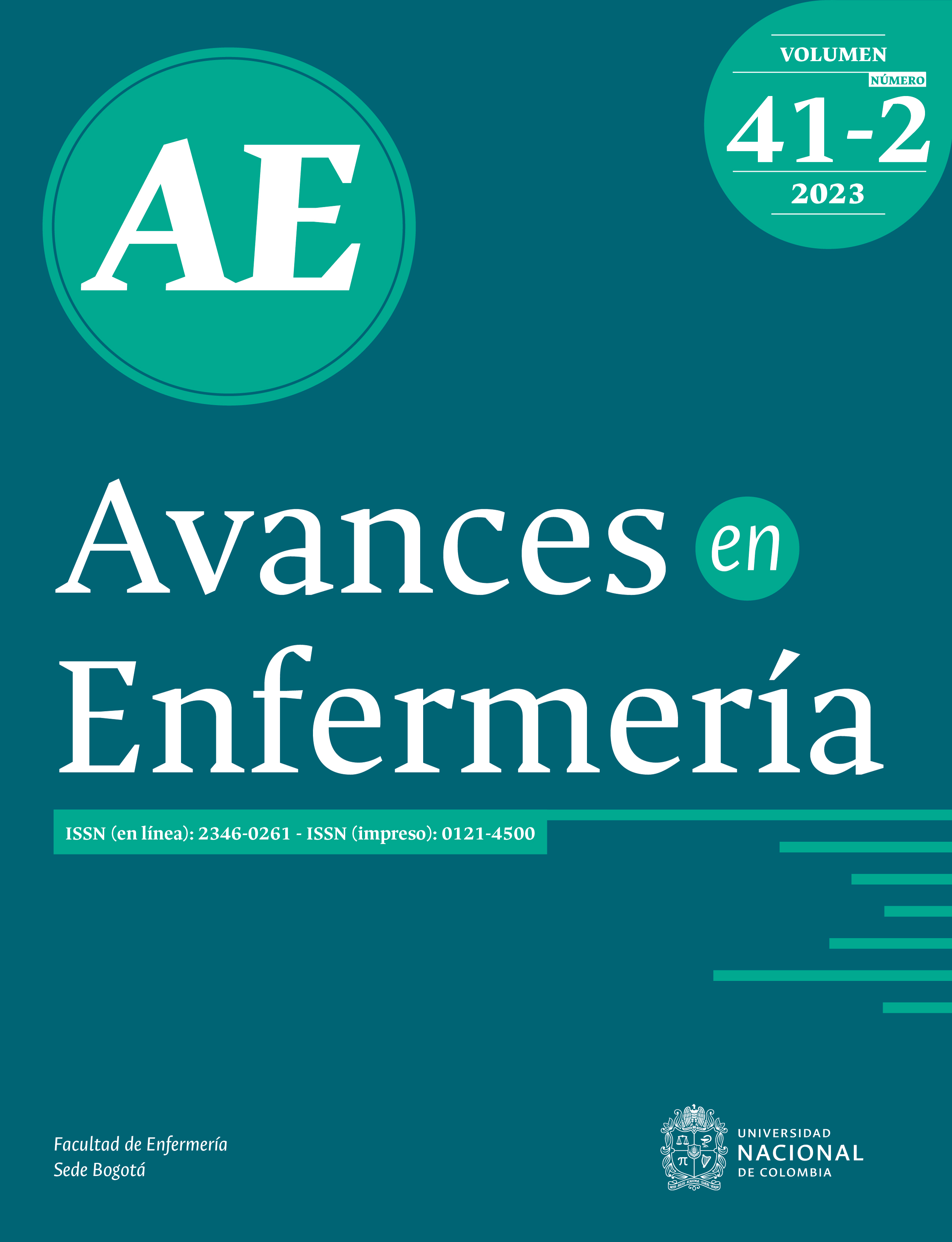Adherencia al tratamiento y creencias sobre los medicamentos en personas con hipertensión arterial
Adherence to treatment and beliefs about medications among people with arterial hypertension
Adesão ao tratamento e crenças sobre medicamentos em pessoas com hipertensão arterial
DOI:
https://doi.org/10.15446/av.enferm.v41n2.93311Keywords:
Cultura, Cumplimiento y Adherencia al Tratamiento, Enfermedades Cardiovasculares, Hipertensión Esencial (es)Culture, Compliance and Adherence to Treatment, Cardiovascular Diseases, Essential Hypertension (en)
Cultura, Cumprimento e Adesão ao Tratamento, Doenças Cardiovasculares, Hipertensão Essencial (pt)
Downloads
Objetivo: evaluar la adherencia al tratamiento y su relación con las creencias sobre los medicamentos en personas con hipertensión arterial (HTA).
Materiales y método: estudio transversal en el que participaron 374 personas con hipertensión arterial, quienes respondieron el Cuestionario de adherencia al tratamiento para pacientes con hipertensión y el Cuestionario de creencias sobre los medicamentos (BMQ, general y específico) validados en Colombia. El análisis de datos se realizó mediante estadística descriptiva y análisis de regresión multivariable.
Resultados: 63,1 % de los participantes fueron mujeres y la edad promedio fue de 70 años (DE: 13,2). La proporción de no adherencia al tratamiento global fue de 53,5 %. En la sección BMQ-General, la puntuación media más alta fue para la subescala "daño" (10,98 ± 2,25), mientras que en la sección BMQ-Específico para HTA fue la subescala "necesidad" (18,6 ± 3,3). En el análisis multivariado se encontró que la adherencia al tratamiento estaba relacionada con las creencias de abuso de la medicación (β = 0,14; IC 95 % 1,004-1,337), la edad (β = -0,03; IC 95 % 0,947-0,987), el sexo (β = -0,53; IC 95 % 0,360-0,955) y estar recibiendo ARA II como medicación prescrita (β = 0,03; IC 95 % 0,289-0,943).
Conclusiones: existe relación entre la adherencia al tratamiento y las creencias sobre el abuso de los medicamentos antihipertensivos, la edad y el sexo. Para mejorar la adherencia al tratamiento de personas con HTA es fundamental identificar las creencias sobre los medicamentos, incluidas las actitudes hacia estos. Por ello, los factores asociados con la adherencia identificados en esta investigación deben considerarse en la realización de futuros estudios sobre el tema.
Objective: To evaluate adherence to arterial hypertension treatment and its relationship with beliefs about medications in individuals with this health condition.
Materials and methods: A cross-sectional study was conducted among 374 individuals with arterial hypertension, who completed the Questionnaire of Adherence to Treatment for Hypertension Patients and the Questionnaire of Beliefs About Medications (BMQ, general and specific) validated for Colombia. Data analysis involved descriptive statistics and multivariate regression analysis.
Results: Out of total participants, 63.1% were women, and the average age was 70 years (SD: 13.2). The proportion of non-adherence to global treatment was 53.5%. In the BMQ-General section, the highest average score observed for the "damage" subscale (10.98 ± 2.25), while in the BMQ-Specific section for arterial hypertension, it was the "need" subscale (18.6 ± 3.3). Multivariate analysis revealed that treatment adherence was associated with beliefs about medication abuse (β = 0.14; 95% CI 1.004-1.337), age (β = -0.03; 95% CI 0.947-0.987), sex (β = -0.53; 95% CI 0.360-0.955), and receiving ARA II as prescribed medication (β= 0.03; 95% CI 0.289-0.943).
Conclusion: There is a relationship between adherence to treatment and the beliefs about the abuse of antihypertensive medications, age, and sex. To enhance treatment adherence in individuals with arterial hypertension, it is crucial to identify beliefs about medications, including attitudes towards them. These factors related to adherence should be considered in future studies.
Objetivo: avaliar a adesão ao tratamento e sua relação com as crenças sobre medicamentos em pessoas com hipertensão arterial.
Materiais e método: estudo transversal, do qual participaram 374 pessoas com hipertensão arterial, que responderam ao Questionário de adesão ao tratamento para hipertensos e ao Questionário de crenças sobre medicamentos (BMQ — geral e específico), validados na Colômbia. A análise dos dados foi realizada por meio de
estatística descritiva e análise de regressão multivariada.
Resultados: 63,1% dos participantes eram mulheres; a idade média foi de 70 anos (DP: 13,2). A proporção de não adesão ao tratamento global foi de 53,5%. Na seção geral do BMQ, a pontuação média mais alta foi para a subescala "dano" (10,98 ± 2,25) e, na seção específica do BMQ para hipertensão arterial, foi a subescala "necessidade" (18,6 ± 3,3). Na análise multivariada, verificou-se que a adesão ao tratamento estava relacionada às crenças de abuso de medicamentos (β = 0,14; IC 95% 1,004-1,337), idade (β = -0,03; IC 95% 0,947-0,987), sexo (β = - 0,53; IC 95% 0,360-0,955) e estar recebendo ARA II como medicamento prescrito (β = 0,03; IC 95% 0,289-0,943).
Conclusões: existe relação entre adesão ao tratamento e crenças sobre o abuso de medicamentos anti-hipertensivos, idade e sexo. Para melhorar a adesão ao tratamento em pessoas com hipertensão, é essencial identificar crenças sobre medicamentos, incluindo ações sobre isso. Esses fatores associados à adesão devem ser considerados em estudos futuros.
References
(1) Roth GA; Mensah GA; Fuster V. The global burden of cardiovascular diseases and risks: A compass for global action. J Am Coll Cardiol. 2020;76(25):2980-2981. https://doi.org/10.1016/j.jacc.2020.11.021
(2) Desta M; Yibeltal D; Memiah P; Ayenew T; Mulugeta H; Gedefaw M et al. Antihypertensive medications adherence and associated uncontrolled blood pressure among hypertensive patients in Ethiopia: Systematic review and meta-analysis. Int J Afr Nurs Sci. 2022;16:100404. https://doi.org/10.1016/j.ijans.2022.100404
(3) Hamrahian SM; Maarouf OH; Fülöp T. A critical review of medication adherence in hypertension: Barriers and facilitators clinicians should consider. Patient Prefer Adherence. 2022;16:2749-2757. https://doi.org/10.2147/PPA.S368784
(4) Götzinger F; Kunz M; Lauder L; Böhm M; Mahfoud F. Arterial hypertension – Clinical trials update 2022. Hypertens Res. 2022;45:1140-1146. https://doi.org/10.1038/s41440-022-00931-2
(5) World Health Organization (WHO). Adherence to long-term therapies: Evidence for action. Geneva: WHO. 2003. https://apps.who.int/iris/bitstream/handle/10665/42682/9241545992.pdf
(6) Karbownik MS; Jankowska-Polańska B; Horne R; Górski KM; Kowalczyk E; Szemraj J. Adaptation and validation of the Polish version of the Beliefs about Medicines Questionnaire among cardiovascular patients and medical students. PLoS One. 2020;15(4):e0230131. https://doi.org/10.1371/journal.pone.0230131
(7) Ashoorkhani M; Majdzadeh R; Gholami J; Eftekhar H; Bozorgi A. Understanding non-adherence to treatment in hypertension: A qualitative study. Int J Community Based Nurs Midwifery. 2018;6(4):314-323. https://www.ncbi.nlm.nih.gov/pmc/articles/PMC6226612/
(8) Cinar FI; Mumcu Ş; Kiliç B; Polat Ü; Bal Özkaptan B. Assessment of medication adherence and related factors in hypertensive patients: The role of beliefs about medicines. Clin Nurs Res. 2021;30(7):985-993. https://doi.org/10.1177/1054773820981381
(9) Horne R; Chapman SCE; Parham R; Freemantle N; Forbes A; Cooper V. Understanding patients’ adherence-related beliefs about medicines prescribed for long-term conditions: A meta-analytic review of the Necessity-Concerns Framework. PLoS One. 2013;8(12):e80633. https://doi.org/10.1371/journal.pone.0080633
(10) Rahman M; Judah G; Murphy D; Garfield SF. Which domains of the theoretical domains framework should be targeted in interventions to increase adherence to antihypertensive? A systematic review. J Hypertens. 2022:40(5):853-859. https://doi.org/10.1097/HJH.0000000000003113
(11) Gobernación de Córdoba. Secretaría de Desarrollo de la Salud de Córdoba. Análisis de situación de salud con el modelo de los determinantes sociales de salud del municipio de Montería. Montería: Gobernación de Córdoba; 2017. https://bit.ly/3QPOpnU
(12) Gorostidi M; Gijón-Conde T; de la Sierra A; Rodilla E; Rubio E; Vinyoles E et al. Guía práctica sobre el diagnóstico y tratamiento de la hipertensión arterial en España, 2022. Sociedad Española de Hipertensión - Liga Española para la Lucha contra la Hipertensión Arterial (SEH-LELHA). Hipertens Riesgo Vasc. 2022;39(4):174-194. https://doi.org/10.1016/j.hipert.2022.09.002
(13) Ma C; Chen S; You L; Luo Z; Xing C. Development and psychometric evaluation of the treatment adherence questionnaire for patients with hypertension. J Adv Nurs. 2012;68(6):1402-1413. https://doi.org/10.1111/j.1365-2648.2011.05835.x
(14) Esquivel Garzón N; Díaz Heredia LP. Validity and reliability of the Treatment Adherence Questionnaire for patients with hypertension. Invest. educ. Enferm 2019;37(3):e09. https://doi.org/10.17533/udea.iee.v37n3e09
(15) Horne R; Weinman J; Hankins M. The beliefs about medicines questionnaire: The development and evaluation of a new method for assessing the cognitive representation of medication. Psychol Health. 1999;14(1):1-24. https://doi.org/10.1080/08870449908407311
(16) Beléndez-Vázquez M; Hernández-Mijares A; Horne R; Weinmann J. Evaluación de las creencias sobre el tratamiento: validez y fiabilidad de la versión española del Beliefs about Medicines Questionnaire. Int J Clin Health Psychol. 2007;7(3):767-779. https://www.redalyc.org/pdf/337/33770313.pdf
(17) Herrera Guerra EP; Robles González JR; Bautista Arellano LR. Validez y confiabilidad del Beliefs About Medicines Questionnaire en pacientes hipertensos colombianos. Rev Cuid. 2021;12(3):e1937. http://doi.org/10.15649/cuidarte.1937
(18) Organización Panamericana de la Salud y Consejo de Organizaciones Internacionales de las Ciencias Médicas (CIOMS). Pautas éticas internacionales para la investigación relacionada con la salud con seres humanos. 4a Edición. Ginebra: CIOMS. 2016. https://bit.ly/3SzD8Jt
(19) República de Colombia. Resolución 8430 de 1993. Bogotá: Ministerio de Salud de Colombia; 1993. https://bit.ly/46KxusT
(20) Horne R. Representations of medication and treatment: Advances in theory and measurement. In: Petrie JK; Weinmann JA. Perceptions of Health and Illnes. 1st. Edition. Psychology Press; 1997. 169-202. https://doi.org/10.4324/9781315078908
(21) Horne R; Parham R; Driscoll R; Robinson A. Patients’ attitudes to medicines and adherence to maintenance treatment in inflammatory bowel disease. Inflamm Bowel Dis. 2009;15(6):837-844. https://doi.org/10.1002/ibd.20846
(22) Park HY; Seo SA; Yoo H; Lee K. Medication adherence and beliefs about medication in elderly patients living alone with chronic diseases. Patient Prefer Adherence. 2018;12:175-181. https://doi.org/10.2147/PPA.S151263
(23) García-Peña ÁA, Ospina D; Rico J; Fernández-Ávila DG; Muñoz-Velandia Ó; Suárez-Obando F. Prevalencia de hipertensión arterial en Colombia según información del Sistema Integral de Información de la Protección Social (SISPRO). Rev. Colomb. Cardiol. 2022;29(1):29-35. https://doi.org/10.24875/rccar.m22000114
(24) Solis A; Bergonzoli-Peláez G; Contreras-Rengifo A. Factores de adherencia al tratamiento de hipertensión arterial en servicios de primer nivel de atención. Univ. Salud. 2022;24(1):95-101. https://doi.org/10.22267/rus.222401.261
(25) NCD Risk Factor Collaboration (NCD-RisC). Long-term and recent trends in hypertension awareness, treatment, and control in 12 high-income countries: An analysis of 123 nationally representative surveys. The Lancet. 2019;394(10199):639-651. https://doi.org/10.1016/S0140-6736(19)31145-6
(26) Alomar Cano M; Álvarez García GM; Andrés Plumed MP; Arias Barroso P; Armentia González MI; Arocas Lázaro F et al. Guía de intervención de Enfermería en hipertensión arterial y riesgo cardiovascular. Madrid: Asociación Española de Enfermería de Hipertensión y Riesgo Cardiovascular (EHRICA) y Universidad Camilo José Cela; 2020. https://www.ehrica.org/wp-content/uploads/2021/10/Guia-EHRICA-2020.pdf
(27) Horne R; Weinman J. Patients’ beliefs about prescribed medicines and their role in adherence to treatment in chronic physical illness. J Psychosom Res. 1999;47(6):555-567. https://doi.org/10.1016/S0022-3999(99)00057-4
(28) Hermansson-Borrebaeck R; Andersson U; Jakobsson U; Midlöv P. Beliefs about medications when treating hypertension in primary health care: Results from “PERson-centredness in hypertension management using information Technology (PERHIT)”. Blood Pressure. 2023:32(1):2226736. https://doi.org/10.1080/08037051.2023.2226736
(29) Widyakusuma NN; Suryawati S; Wiedyaningsih C; Probosuseno. What do seniors believe about medication adherence? A qualitative study among seniors with chronic conditions in Yogyakarta, Indonesia. Patient Prefer Adherence. 2023; 17:1381-1392. https://doi.org/10.2147/PPA.S412981
(30) Suárez-Argüello J; Blanco-Castillo L; Perea-Rangel JA; Villarreal-Ríos E; Vargas-Daza ER; Galicia-Rodríguez L et al. Creencias de enfermedad, creencias de medicación y adherencia al tratamiento en pacientes con hipertensión arterial. Arch. cardiol. Méx. 2022;92(3):327-333. https://doi.org/10.24875/acm.21000026
(31) Al-Noumani H; Wu JR; Barksdale D; Sherwood G; Alkhasawneh E; Knafl G. Health beliefs and medication adherence in patients with hypertension: A systematic review of quantitative studies. Patient Educ Couns. 2019;102(6):1045-1056. https://doi.org/10.1016/j.pec.2019.02.022
How to Cite
VANCOUVER
ACM
ACS
APA
ABNT
Chicago
Harvard
IEEE
MLA
Turabian
Download Citation
License
Copyright (c) 2023 Eugenia del Pilar Herrera Guerra, Neila Esther Berrocal-Narváez, Beatriz Elena Tejada-Vergara

This work is licensed under a Creative Commons Attribution-NonCommercial 4.0 International License.
All articles published by Avances en Enfermería are licensed under the Creative Commons Attribution 4.0 International License. Starting 2020, we added the CC-BY-NC recognition to the license, which means anyone is allowed to copy, redistribute, remix, transmit and transform our contents with non-commercial purposes, and although new works must adequately cite the original work and source and also pursue non-commercial purposes, users do not have to license derivative works under the same terms.































